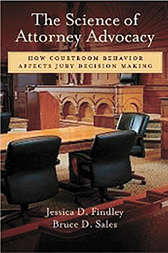Subscriber Benefit
As a subscriber you can listen to articles at work, in the car, or while you work out. Subscribe Now
 Unlike other books I have recently reviewed, the book “The Science of Attorney Advocacy” targets a different type of reader. If you are a curious law student or devoted trial consultant wanting to know more about trial advocacy and how it interfaces with social science research, this book will interest you. If you are a trial lawyer or professor and want a quick overview of courtroom and trial psychology protocol, this is a readable introductory.
Unlike other books I have recently reviewed, the book “The Science of Attorney Advocacy” targets a different type of reader. If you are a curious law student or devoted trial consultant wanting to know more about trial advocacy and how it interfaces with social science research, this book will interest you. If you are a trial lawyer or professor and want a quick overview of courtroom and trial psychology protocol, this is a readable introductory.
The book has six chapters plus an introduction covering a wide range of secondary topics: attorney demeanor, verbal communication, paralinguistics (study of pitch, volume and intonation), kinesic communications (study of body movement, gestures and facial expressions), attorney-client relationships and attorney storytelling. It consists of 298 pages and costs around $50.
Each chapter examines relevant research literature to see what commonly held beliefs are actually supported and which ones are not. This overview is then followed by recommendations and conclusions. Each chapter is like a sprint through the mountains of social science research literature underlying much of what we know or believe about the role of the various facets of courtroom persuasion. For example, the chapter on attorney demeanor analyzes likability, honesty, fairness and credibility and the likely effect these have on a juror. The authors then examine the social science research to see what part of trial advocacy is supported or not supported by the literature. Each chapter subtopic is kind of like a “MythBusters” for the trial attorney.
No book is perfect; all have some weakness. I was disappointed that most of the cited research was relatively old by research standards. Old doesn’t mean bad, just potentially outdated. Although the reference section boasts an impressive 900-plus citations, most of the cited sources are pre-2005. There has been a huge amount of research published since 2005 that could easily have been cited. There are a few reference throw-ins after 2005, as if more recent pieces were tossed in to make the book seem more comprehensive than it actually is. The most glaring absences in this reference section are the ubiquitous “Reptile” by David Ball and Don Keenan and “Rules of the Road” by Rick Friedman.
Authors Jessica Finley and Bruce Sales, each with J.D. and Ph.D. degrees, present an even balance of the released research findings and adopt a “just the facts ma’am” approach. In the end, the reader is left a little overwhelmed because of the point/counterpoint style of the research findings. It should not surprise the reader that not all trial-related research yields consistent black and white results.
What the reader will not find are sweeping revelations, conclusions or insights. There are no easy answers telling the trial lawyer what he should do to maximize effectiveness with jurors. In fact, the book shows trial effectiveness depends on many complex human and situational factors. While Findley and Sales have done a terrific job of summarizing the classic social science research studies up through 2005, the topics remain perplexing to the advocate trying to make sense of it all. This book, indirectly, highlights the limitations that can be made about human perception and decision making. In the end, jury selection remains largely an enigma.•
__________
Rodney Nordstrom Ph.D., J.D., is a trial consultant with his company Litigation Simulation Services (www.litsim.com) located in Peoria, Ill. The opinions expressed in this column are those of the author.
Please enable JavaScript to view this content.
